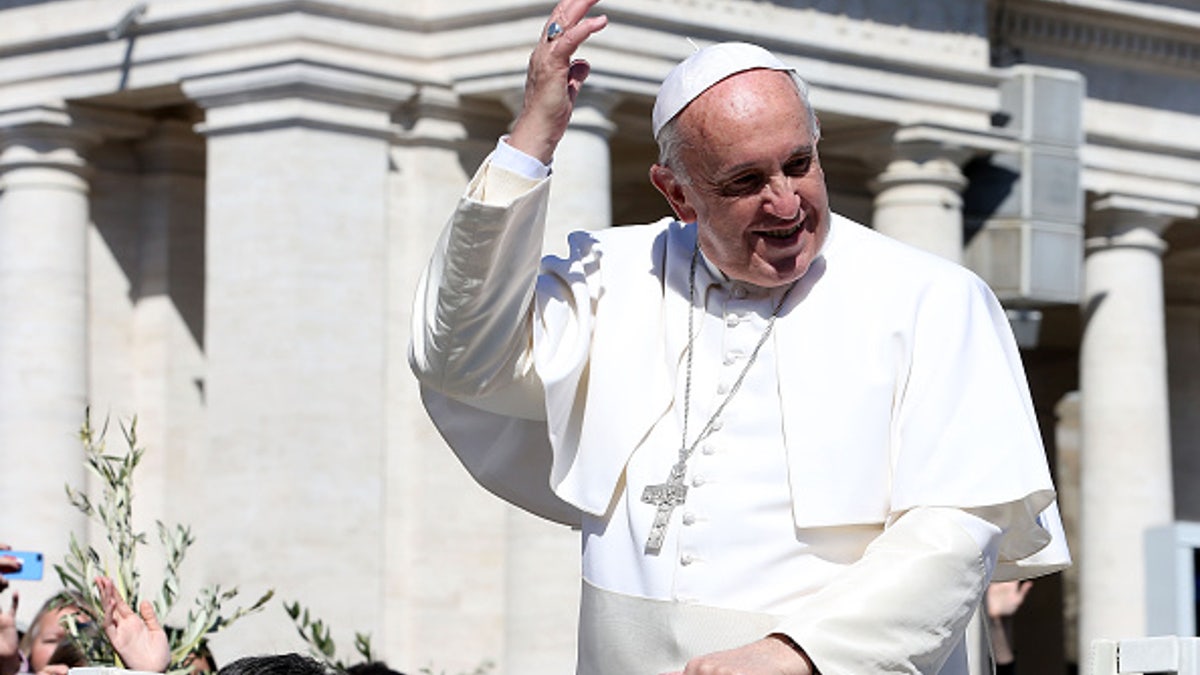
VATICAN CITY, VATICAN - MARCH 29: Pope Francis waves to the faithful as he leaves St. Peter's Square at the the end of Palm Sunday Mass on March 29, 2015 in Vatican City, Vatican. On Palm Sunday Christians celebrate Jesus' arrival into Jerusalem, where he was put to death. It marks the official beginning of Holy Week during which Christians observe the death of Christ before celebrations begin on Easter. (Photo by Franco Origlia/Getty Images) (2015 Getty Images)
This weekend I met a Spanish missionary who has for the last three years been working in Bolivia, primarily with homeless orphan children and teenagers. We had a fascinating discussion about Pope Francis and his upcoming visit to the United States which helped to clarify something for me Americans find hard to grasp: Pope Francis’ feet are firmly planted in the Developing World.
My missionary acquaintance said: “This is a Pope for the Church as it is coming to be: a Church of the Southern Hemisphere and a Church of the poor and struggling.” We talked about how the Church is growing in Africa, and how it is still vibrant and populous in Latin America and Brazil. The people are poor, but also young and procreative there, full of life and energy.
Just think back to World Youth Day and the mobs of excited Catholics that greeted “O Papa” with characteristic Brazilian warmth and enthusiasm. In contrast we have the sclerotic and post-modern Europe, who Francis has described as a “grandmother”, sterile and cold, materially blessed but slowly dying off of its own volition.
It requires an enormous effort to view our world through a different lens, and see it the way our brothers and sisters far away experience it. But that is what he asks.
The needs of the growing Church are different from the needs of the aging Church, and Pope Francis speaks and acts in ways that resonate with the teeming lower hemisphere. The missionary described how he cherishes the way Pope Francis keeps directing our eyes and attention to the wretched and marginalized. In Bolivia, he told me, at night the streets of the cities are thronged with children, who are disconnected from their parents, sleeping on dirty sidewalks, and covering themselves with cardboard. They soothe their misery with drugs that destroy their stunted bodies and brains. The middle and upper class denizens walk right past them, on their way to dinner or the movies, without once turning their eyes to them. The sight is too common, the problem too pervasive, to provoke their dismay.
I can identify with that. I grew up in the Third World, and on the middle class street I lived on, in the heart of a big city, were many who lived in corrugated metal lean-tos between the substantial houses. This was our normal and our eyes were used to it. On a more recent visit, while leaving a restaurant in Quito after midnight, we were asked for alms by a boy who couldn’t have been more than ten years old. He was accompanied by a much younger brother and sister, all of them barefoot and shivering in the cold. Our Ecuadorian friends were inured to the sight.
Imagine that scenario: Walking though a parking lot, late at night, and finding young children begging in the cold, hungry and needy. And then giving them some coins and walking on. This is the reality that the Pope is rooted in, the pastoral needs that he attended to day after day in Argentina and the ones he continues to address from Rome. As he said: “This is what I want, a poor Church for the poor.” The needs of the poor are obvious, material and abundant, and the needs of the prosperous are spiritual. The prosperous must be taught to rebel against the sight of wretchedness and fight the complacency that so easily pervades the comfortable.
Statements by the Pope like: “Human rights are not only violated by terrorism, repression, or assassination, but also by unfair economic structures that create huge inequalities,” make a lot of sense when seen from his perspective as a pastor to the poor and impervious rich. In developing countries, hard work and perseverance alone often are not enough to enable a man or woman to earn enough to feed and clothe their children. The decks are stacked against them by endemic corruption and economic structures that are inherently unfair and favor a small minority of the populace. Prosperity there is not a tide that lifts all boats. Pope Francis said, “The promise is that when the glass was full, it would overflow, benefiting the poor. But what happens instead, is that when the glass is full, it magically gets bigger and nothing ever comes out for the poor.”
Here in our own country, we have some difficulty understanding that. Many of us, my family included, arrived here with nothing but a desire to work hard and take care of each other. The United States welcomed us and gave us the opportunities we longed for. Here, the generosity of our safety nets keeps the wolf from the door, and the level playing field that is American society ensures that our beginnings cannot entirely dictate our ends. A boy or girl, no matter what side of the tracks they come from, can achieve stability and a modicum of prosperity, and with lots of hard work and some good luck, even affluence.
Pope Francis speaks to each of us, whether we suffer from material poverty or moral poverty, and bids us to “meet one another doing good.” It requires an enormous effort to view our world through a different lens, and see it the way our brothers and sisters far away experience it. But that is what he asks.
The missionary observed, “How hard it must be to be the Pope of the whole world.” I think he is right.
